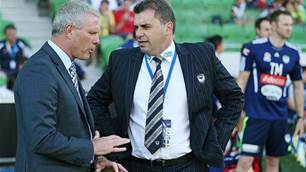THE MUCH-ANTICIPATED new Government report into football in Australia has been published and recommended five key ways to improve the game in this country.
The Smith Review has lauded the FFA's achievements since the last Government report - the 2003 Crawford Report - which led to the set up of the A-League.
And it hailed the vast improvement in the Socceroos who have soared in FIFA world rankings from 86th to 22 and gone to two World Cups since the Crawford Report.
Football has also seen participation rates increase from 1.1 million to 1.7 million during that time while this season's crowds are up 52 percent on last year's average and TV ratings are 74 percent better.
"These positives around the game are significant," says the report.
"The FFA Board and its administration must be credited for bringing the game such a long way forward from where it was immediately preceding the Crawford Review."
It also backed the FFA's failed 2022 World Cup despite the criticism when Australia picked up just one vote at the final tally and lost out to Qatar.
"The bid to host this event was ambitious, yet strong and credible," says the report.
"It is important to remember that despite the criticism FFA and the bid have received since Qatar was announced as host (and questions remain about the integrity of the process); the bid was technically excellent and had strong, bipartisan government support.
"Other bids which were also seen to be of superior technical quality were similarly unsuccessful.
"Nonetheless, the conclusion of the 2022 World Cup bid process has created opportunities to refocus on the game domestically."
The latest report has found five essential areas where the FFA can improve the game even further.
The first is to lay the groundwork for expansion by consolidating the current set-up with at least a freeze on the salary cap, and marquees only approved if the club can afford them.
Player wages currently account for 40 percent of the A-League's income, compared with 20 percent at rival codes, says the report.
"Salaries have increased at an unsustainable rate," it adds. "It is out of step with the income the product generates and at a time when the Australian dollar is extremely competitive in the international player recruitment market.
"At a minimum the salary cap must be frozen, but it would be appropriate to explore options to reduce the cap."
It also says the A-League should stick to ten clubs for the moment - but highlights the missed potential in Western Sydney.
"When the A-League does introduce a new team to a new market, an important factor should be consideration of where the connection with grassroots can be best achieved," it says.
"For example, there is no A-League team in Western Sydney, but some 137,000 participants. This represents a significant opportunity."
It also recommends putting the FFA Cup on hold until the FFA has a sponsor and TV rights confirmed.
The second key finding is to cut FFA's head office costs, with a view to cutting wages, staff numbers and the five star travel plans of certain key staff.
"Administration of the game should take a ‘lean’ approach to its own operations," says the report.
"As long as FFA receives public funds, FFA head office should be required to identify, deliver and report on cost reductions.
"Plans to increase the workforce should be put on hold, with any salary increases funded via further efficiencies.
"More efficient approaches to travel and other procurement should be explored. Maintenance of core activities and programs would be expected."
It also recommends exploring ways of cutting the costs associated with the national teams but acknowledges this may come at the expense of development squads.
Thirdly, A-League clubs and owners need to be given more input into the decision-making process as it affects their league.
But the report stops short of saying the A-League should be autonomous from the FFA , highlighting that the league is not mature enough to stand on its own feet yet.
"It is important that these owners contribute to the strategic direction of the competition and have an opportunity to influence decision-making that impacts on their costs or ability to generate revenue," says the report.
"It is in both FFA’s and owners’ interests to see the A-League flourish. There must be an alignment of interests between club owners and FFA, where both contribute to strategic direction and address challenges.
"Costs must be reduced – player salaries and stadia deals represent costs disproportionate to revenue. The A-League must live, and grow, within its means."
On the issue of the breakaway A-League - as recommended by the Crawford Report - the Smith Review backs the FFA for maintaining overall control.
"This has been carefully examined and is not an option that would be appropriate to pursue at this time," it says.
"The A-League relies on a stream of funding from FFA and shares critical services. The competition is still in its relative infancy and has not matured to the point that it could survive if separated from FFA.
"It is for these reasons that the initial decision to manage the A-League from within FFA was sound."
Fourthly, the report says the Government needs to look at the effect of its proposed anti-siphoning laws on broadcast rights negotiations.
The report noted that the Government's planned inclusion of World Cup qualifiers on the anti-siphoning list could hurt the FFA's ability to negotiate a better TV deal.
The report suggests the Government could take the developmental stage of football into account and allow the FFA to continue to bundle the qualifiers with the A-League and other Socceroo matches outside the World Cup finals as at present.
Finally the report highlights the continuing need to connect even more with the grassroots and link with the community, and demanded the FFA comes up with fresh proposals outlining how they plan to do that.
"A-League clubs must tap into the participation base to establish a connection with grassroots," it says. "The juniors of today should be the players, volunteers, fans and football community of the future.
"This is more than a marketing challenge. Winning hearts and minds is about integrating with the community, forging a connection, formal linkages and development pathways with junior, intermediate and top tier competitions.
"FFA should report to government in coming months proposing options for a way forward."
Related Articles

Kiwi legend: A-League can seize the day post-COVID-19

Backlash over Fox Sports new season launch













